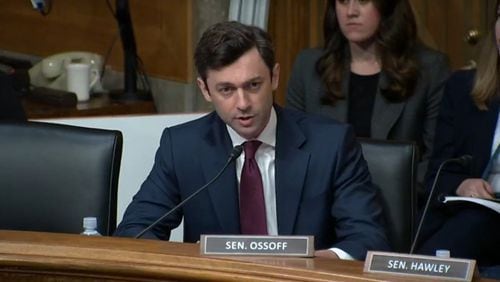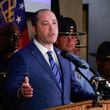The plan to build a new $1 billion retractable-roof stadium in downtown Atlanta spurred sharp debate at a regular board meeting of Invest Atlanta, the city’s economic development agency that may be charged with lining up about $200 million in bond financing for the project.
Board member Julian Bene questioned what the city would get for its money and argued that the new stadium would create only 600 or fewer permanent jobs — his admittedly informal calculation.
Spending $500 million in hotel-motel taxes over 30 years for that number of jobs is “completely out of line” with what Invest Atlanta would typically do, said Bene, a longtime consultant for biotech pharmaceutical companies.
“There are some football issues,” he added, “that are non-economic.”
“There’s no way we would ever spend half a billion dollars on a 500-job or 600-job operation,” he told Channel 2 Action News in a later interview.
Bene’s stance drew a sharp response from board member Constance Barkley-Lewis, who called Bene’s analysis “way too simplistic … and not a smart way to go about it.”
Other officials said the merits of the project depend on how much economic development — including jobs and technical training — spills into surrounding areas.
“If we just looked at the stadium as a stadium, then I think, Julian — you’re right,” said board member Joseph A. Brown. But that would ignore the chance to treat the stadium as a an economic engine for the struggling neighborhoods around it, Brown said.
“There’s such a dramatic need there,” Brown said.
Ernestine Garey, chief operating officer of Invest Atlanta, said previous efforts at reviving the neighborhoods around the Georgia Dome, including programs to provide affordable housing, fell short. They did little to solve the problems of crime, flooding and lack of job training, she said.
Cleta Winslow, who represents part of the Castleberry Hill near the current Georgia Dome, said residents expect elected officials to secure local benefits.
“The communities have not said ‘no’ (to a new stadium) — they are looking to us to see what we can extract out of this,” she said.
In Thursday’s meeting, Doug Selby, an attorney for the agency, laid out the steps required before the stadium can go forward.
The City Council would need to pass a resolution to continue the local hotel-motel tax through 2050, which would back the $200 million in revenue bonds. Various agreements between the city, state and Falcons would need to be signed. Invest Atlanta would need to select an underwriter and finalize bond documents.
The bonds would be back by the local hotel-motel tax, which brings in about $17 million per year.
Mayor Kasim Reed has promised that property taxes would not be raised to finance the stadium. About 86 percent of the revenue from the hotel-motel tax comes from people who are visiting from outside Georgia, according to city documents. Several officials indicated they planned to tout that point in upcoming meetings with residents.
Critics of the proposed project say that “a billionaire wants us to help him build a new stadium,” said Barkley-Lewis. “There’s so much anxiety around this, because it feels like $200 million in taxes, which is really not what’s going on.”
About the Author





